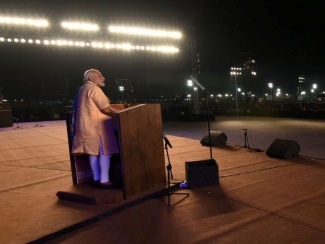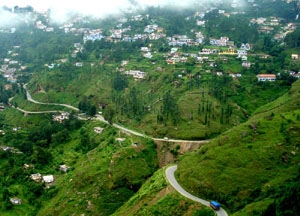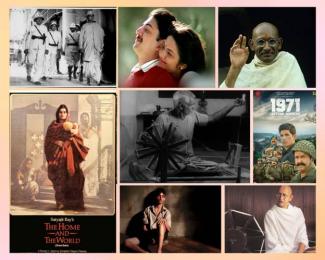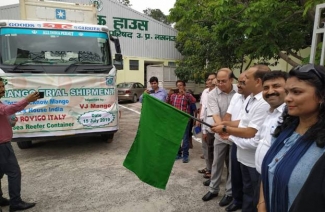
English Translation of the text of PM’s ‘Mann ki Baat’ programme on All India Radio on 26.02.2017
My dear countrymen, Namaskar. Winter is on its way out. Vasant, the season of spring has just started to step into our lives. After the departure of PATJHAD, when old and withered leaves fall, new leaves begin to sprout on the trees. Flowers bloom. Gardens and orchards sport a verdant green. The melodious chirping of birds warms the cockles of our hearts. Not just flowers, fruits too appear to be shining bathed in the sun rays on tree branches. The flower heads of the summer fruit mango manifest themselves in the spring season itself. At the same time bright yellow flowers of mustard swaying in their fields kindle hope in the hearts of the farmers. Blossoming of bright red Jungle Flame flowers, better known as Tesu or Palash heralds the advent of Holi. Amir Khusro has portrayed these moments of change of season in a very interesting manner. Amir Khusro has written:
Phool rahi sarson sakal ban
Ambwa phoote, Tesu phoole
Koyal bole, daar daar.
that is,
Behold the mustard blooming everywhere, all around Here the inflorescence on the mango tree, there the Jungle Flame blossoms.The nightingale can’t help but sing merrily on the branches.
When nature is at her joyous best, when the season is enchanting, we human beings too enjoy this to the fullest. The festivals of Vasant Panchami, Mahashivratri and Holi, impart hues of happiness to a person’s life. In an ambience of love, brotherhood and humanity, we are about to bid adieu to the last month of Phalgun and are eagerly awaiting to welcome the arrival of the new month of Chaitra. The Ritu of Vasant, that is, the season of spring is indeed the confluence of these two months.
At the outset, I express my gratitude to lakhs of citizens of our country for sending in a multitude of suggestions when I ask for them before ‘Mann Ki Baat’. On the NarendraModiApp, on Twitter, on Facebook, by post - I thank all of you for that.
Shobha Jalan has written to me on the NarendraModiApp that many in the public are not aware of the achievements of ISRO. And therefore she wants me to provide some information on the recent launch of 104 satellites and the Interceptor Missile. Shobha Ji, thank you very much for paying attention to this shining example of India’s pride. Whether it is eradicating poverty, preventing diseases, connecting with the world, or disseminating knowledge and information, technology and science have made a mark for themselves. 15th February, 2017 is a day of immense pride for India. Our scientists have brought laurels to the nation, witnessed by the whole world. And we know that over the last few years, ISRO has accomplished various unprecedented missions with flying colours. After the successful mission of sending Mangalyaan to planet Mars, recently ISRO scripted a world record in the arena of space. In a mega mission, ISRO has successfully launched 104 satellites simultaneously into space. These satellites belonged to various countries such as America, Israel, Kazakhstan, Netherlands, Switzerland, UAE and, of course, India. India has created history by becoming the first country to launch successfully 104 satellites into space at one go. And what is further heartening is the fact that this was PSLV’s 38th successive successful launch. This is a historic achievement for not just ISRO but for all of India. This cost effective, efficient space programme of ISRO has become a marvel for the entire world; the world has admired this success of Indian scientists of India whole-heartedly.
Brother & sisters, one out of these 104 satellites is extremely important. It is Cartosat 2D, which is India’s satellite and the pictures clicked through it will be of great help in mapping of resources and infrastructure, evaluating development and planning for urban development. Particularly for my farmer brothers and sisters, our new Satellite Cartosat 2D will be immensely helpful on a whole lot of subjects such as knowing how much water is there in our existing water sources, how this should be best put to use, what things to keep in mind in this regard. Almost immediately after its launch, our satellite has sent back some pictures. It has commenced functioning. It is also a matter of exultation for us that this entire campaign was led and steered by our young scientists, our women scientists. This tremendous participation of youth and women is a major glorious dimension in ISRO’s success. On behalf of our countrymen, I heartily congratulate the scientists at ISRO. Adhering consistently to the objective of bringing Space Science to the common man, for the service of the nation, they are creating one record after another. One runs short of words in complimenting and congratulating our scientists, their entire team.
Shobha Ji has asked one more question and that pertains to the security of India. It is about India having acquired a great capability. This important matter has not been discussed much, but it has drawn Shobha Ji’s attention. In the field of defence also, India has successfully test fired the Ballistic Interceptor Missile. During its trial, this missile, based on interceptor technology, destroyed an enemy missile at an altitude of about 100 km above the surface of the earth and thus marked its success. This is a significant, cutting edge competency in the arena of security. And you will be happy to know that hardly four or five countries in the world possess this capability. India’s scientists have demonstrated this prowess. Its core strength lies in the fact that if, even from a distance of 2000 km, a missile is launched to attack India, our missile can pre-emptively destroy it in the space itself.
When we witness new technology, or a new scientific feat, we are left overwhelmed with joy. Inquisitiveness has played a significant role in the journey of progression of human life and development. And those gifted with extra-ordinary intelligence do not let inquisitiveness to remain just that; they begin further questioning it, look around for newer queries, and try to create new realms in the spirit of enquiry. This incessant spirit of enquiry leads to new inventions. They do not rest till they obtain an answer. If we try to take a bird’s eye view of thousands of years of the onward march of human life and progress, we can easily say that this great journey has no point of culmination. A full-stop is impossible. Attempting to know the universe, the laws of Nature, the inner recesses of the human mind is an unending process. This is what begets new Science, new technology. And every technology, every new form of Science gives birth to a new era.
My dear young friends, while we refer to Science and the sheer perseverance of scientists, I have many a time said in ‘Mann Ki Baat’, that the attraction of Science for our young generation should increase. The country needs more and more scientists. Today’s scientist becomes a potent catalyst for enduring change in the lives of our future generations.
Mahatma Gandhi used to say, “No Science has dropped from the skies in a perfect form. All Sciences develop and are built up through experience”.
Revered Bapu had also remarked, “I have nothing but praise for the zeal, industry and sacrifice that have animated the modern scientists in the pursuit after truth”.
When Science is harnessed keeping in minds the needs of common folk, when ways and means to naturally use those principles for people’s requirements are devised, when appropriate mediums and technologies are deliberated upon, it paves the way for it to be considered the most valuable contribution for general humanity. Recently, during the 14th Pravasi Bharatiya Diwas, Niti Aayog and India’s Foreign Ministry had organized a unique competition. Socially useful innovations had been invited. These innovations were identified and showcased, and people were being informed about them, along with touching upon such issues as harnessing them for the use by the common people and their mass production and commercial utilization. I saw the volume of remarkable work done in that area. To give you an example, I came across an innovation for our poor fishermen brethren. It is a simple mobile App. But it is so powerful that when a fisherman goes to sea for fishing, this App is able to provide guidance for direction to locate the most productive fishing zones and also provide multifarious types of information such as the direction and speed of the wind, the height of waves and so on. This whole array of information is available on this mobile App which can be utilised by our fishermen brethren for moving to those areas with maximum fish presence in a very short time and thus earning their livelihood.
There are times when a problem portrays the importance of Science for finding its solution. In 2005, there was a very heavy downpour in Mumbai, which resulted in flooding, and even high tides in the sea, leading to terrible hardships. Whenever a natural calamity strikes, it is the underprivileged, who are the first in bearing its brunt. In that situation, two persons worked in right earnest and developed a dwelling structure that saves the house and its occupants, mitigates the water-logging and can prevent water borne diseases also. There were a large number of such innovations.
What I’m trying to infer is that in society, in the country, there are many who take on such roles. And our society is also increasingly turning out to be technology driven. Systems are getting technology driven. In a way, technology is becoming an inseparable part of our lives. In the recent days, one can see a lot of emphasis being laid on Digi-Dhan. Gradually, people are shedding their hard currency mindset and moving towards digital currency. Digital transactions in India are witnessing a very rapid surge. The young generation, in particular, is getting habituated to digital payments through its mobile handsets. I believe this to be a good portent. In recent times, Lucky Graahak Yojana and Digi-Dhan Vyapari Yojana have received overwhelming support. For about two months now, everyday fifteen thousand people have been winning a prize of a thousand rupees each. And through these two schemes, the process to make digital payment a mass movement has been initiated; it has received a rousing welcome in the entire country. It is a delight to learn that till now, under the Digi-Dhan Yojana, ten lakh people have been rewarded, over fifty thousand traders have won prizes and an amount of almost over a hundred & fifty crores rupees has been earned as prize money by people who have promoted and carried forward this great campaign. Under this scheme, there are more than a hundred customers who have received prizes of one lakh rupees each. There are more than four thousand traders who have got prizes of fifty thousand rupees each. Be they farmers, traders, small entrepreneurs, professionals, housewives, students – all are enthusiastically participating and also getting benefits from it. When I wanted to know the analysis, as to whether it’s only the young people who come forward or there are elders persons too, I was heartened to learn that among the recipients, there were 15 year old young persons, as well as elderly people aged 65-70.
Shriman Santosh Ji from Mysore, expressing joy, has written on the NarendraModiApp that under the Lucky Grahak Yojana, he received a reward of a thousand rupees. But I feel I must share with you what he has written most prominently. He says that when he received this reward, it struck him that a poor old woman had lost all her belongings because of a fire that broke out in her house. He felt she had more a rightful claim on the reward he had got and gave away the thousand rupees to her. And he derived a lot of Santosh, that is, satisfaction through his deed. Santosh Ji, your name and your deed – both are sources of SANTOSH, satisfaction for all of us. You have done something that is exemplary and inspiring.
A 22-year old cab driver brother Sabir from Delhi adopted the digital mode in his transactions after demonetisation and went on to win a prize of one lakh rupees under the ‘Lucky Grahak Yojana’ of the Government. Though he continues to be a driver, in a way, he has now become an ambassador for this scheme. He keeps imparting knowledge about digital usage to his passengers all the time. He is extremely enthusiastic and motivates others also to go digital.
One young post-graduate student Pooja Nemade from Maharashtra keeps sharing her experience with friends about how her family members are using RuPay Card and e-wallet facilities and deriving enjoyment out of it and also as to how important the prize of rupees one lakh is for her. She has taken up this in a mission mode and is bringing others into its fold.
I urge my countrymen, especially the youth of our country and those who have won prizes under ‘Lucky Grahak Yojana’ or ‘Digi-Dhan Vyapar Yojana’ to become ambassadors of these schemes on their own. Lead this movement. Take it further as it has a very major and prominent role in the fight against corruption and black money. To me, each and every individual involved in this mission constitute a new anti-corruption cadre in the country. In a way you are a soldier in the cause of cleanliness and purity. You know that this scheme will complete its 100 days on 14th April, the birth anniversary of Dr. Babasaheb Ambedkar, a truly memorable day. There is going to be a very big draw of prizes worth crores of rupees on 14th April. There are still about 40-45 days left for that. Can you do one thing in the memory of Babasaheb Ambedkar? We have recently celebrated 125th birth anniversary of Baba Saheb Ambedkar. Remembering him, you teach at least 125 persons about downloading the BHIM App. Also teach them about the procedure of making transactions through this App; teach this specially to small traders in your neighbourhood. Give special importance to Baba Saheb Ambedkar’s birth anniversary this time and the BHIM App. For this, I would like to say that we have to strengthen the foundation laid by Dr. Baba Saheb. We have to go from door to door associating everybody in order to place the BHIM App in 125 crore hands. Since its beginning about two-three months ago, this movement has had a clear impact and has been a very big success in many townships, villages and cities.
My dear countrymen, agriculture makes a very major contribution to the fundamentals of our country’s economy. Economic prowess of villages imparts momentum to the nation’s economic progress. I wish to share a very happy news with you today. Our farmer brothers and sisters have toiled hard to fill our granaries. The hard work of the farmers has resulted in a record production of food grains. All signals indicate that our farmers have broken all previous records. There has been such bountiful crop this time in the fields of our farmers that every day has appeared to be a celebration of Pongal and Baisakhi. More than two thousand seven hundred lakh tonnes of food grains have been produced in the country this year. This is 8 percent more than the last record set up by our farmers. Thus, it is an unprecedented achievement in itself. I want to specially thank the farmers of the country. I also want to thank our farmers for keeping the poor in mind and adopting cultivation of various pulse crops also besides the traditional crops because pulses are the biggest source of protein for poor people. I am happy that the farmers of my country heeded the needs of our poor people and cultivated various pulse crops on about 290 lakh hectare land. This is not merely the production of pulses but a yeoman service rendered by the farmers to the poor of my country. My farmer brothers and sisters deserve special gratitude for the way they whole-heartedly accepted my request, my prayer and put in their hard labour to get a record production of pulses.
My dear countrymen, the government, society, institutions, organizations, in fact everyone, is making some or the other effort towards greater cleanliness. In a way, everyone is seen working towards the cause of cleanliness in a conscious manner. The government is continuously making efforts in this regard. Recently, an event was organised in Telengana under the leadership of the Secretary of our Ministry of Water and Sanitation of the Government of India, in which senior officers from 23 state governments participated. And, this was not confined to having just a closed door seminar, but the importance of cleanliness was practically demonstrated at Warangal in Telangana. Toilet pit emptying exercise was carried out in Hyderabad on 17th and 18th February. Toilet pits in six houses were emptied and cleaned and the officers personally demonstrated that the used up pits of twin pit toilet can be emptied and then re-used. They also displayed as to how convenient these new technique toilets are and there is absolutely no inconvenience or hesitation in emptying or cleaning these toilets and even the psychological barrier does not come in the way at all. And, we can ourselves clean these toilet pits just as we do other general cleaning. And, this exercise showed results, media in the country gave it wide publicity and highlighted its importance. And it is quite natural also because when people see an IAS officer cleaning a toilet pit himself, the fact is naturally noticed by the country. And we consider the waste taken out from a toilet pit as sheer useless garbage but if considered from the angle of its use as a fertiliser, this, in a way, is black gold. We can clearly see the conversion of waste to wealth. This has been proved too. For a family of six members, the model of one standard Twin Pit Toilet gets filled in about five years. After that the waste can easily be redirected to the other pit. This waste deposited in the pit gets completely decomposed in six to twelve months time. This decomposed waste can be safely handled quite conveniently and can be used as ‘NPK’ which is a very useful fertilizer. Our farmers know ‘NPK’ very well. It contains nutritious elements Nitrogen, Phosphorous and Potassium in abundance and is considered a fertiliser of very good quality in the agriculture sector.
Others must also have experimented with initiatives similar to those undertaken by the Government. Now Doordarshan is broadcasting a special programme of ‘Swachchhta Samachar’, that is ‘Cleanliness News’. Highlighting such things in this programme will be very beneficial. Various government departments regularly observe Cleanliness Fortnight. During the first fortnight of March, Women and Child Development Ministry along with the Ministry of Tribal Affairs will be laying stress on the Cleanliness Campaign. And two other ministries, the Ministry of Shipping and the Ministry of Water Resources, River Development and Ganga Rejuvenation will take the Cleanliness Campaign forward during the last two weeks of March.
We know that whenever an Indian achieves something notable, the whole country feels a new energy and the self-confidence gets a boost. We all hailed the commendable performance by our Divyang Players at Rio Paralympics. India defeated Pakistan in the final of the Blind T-20 World Cup held earlier this month to become World Champions for the second consecutive time and thus raised our national prestige to a new height. I once again congratulate all players of our team. The country is really proud of these Divyang friends for their achievement. I always believe that Divyang brothers and sisters are capable, strongly determined, courageous and possess tremendous resolve. We get to learn something each moment from them.
Be it the field of sports or space science, the women of our country lag behind none. They are moving ahead shoulder to shoulder and are bringing glory to the nation with their commendable achievements. Our women players won a silver medal at the Asian Rugby Sevens Trophy recently. My heartiest congratulations to all these players.
The whole world celebrates 8th March as Women’s Day. In India also more importance needs to be given to our daughters along with increased awareness and sensitivity towards them. ‘Beti Bachao - Beti Padhao’ movement is moving forward with rapid strides. This is no longer just a government programme. It has now become a campaign of societal empathy and public education. During the last two years this programme involved the common man; it has forced people from all corners of the country to think and ponder over this burning issue; and brought about a change in people’s thinking about our traditional beliefs and customs which have been prevalent for many years. It gives us great joy and happiness when we hear the news of festive celebration on the birth of a daughter. In a way, a positive mindset towards our daughters is leading towards societal acceptance. I have heard that in Cuddalore district of Tamil Nadu, child marriage has been banned under a special campaign. About 175 child marriages have been prevented so far. The district administration has opened bank accounts of over 55-60 thousand daughters under ‘Sukanya Samridhi Yojana’. In Kathua district in Jammu & Kashmir, all departments have been connected with ‘Beti Bachao – Beti Padhao Yojana’ under the Convergence Model and in addition to the convening of Gram-Sabhas, all efforts are being made by the district administrations for adoption of orphan baby girls and to ensure their education. In Madhya Pradesh, under the “Har Ghar Dastak” programme a campaign is being run to go to every village and every house to encourage education of daughters. In Rajasthan ‘Apna Bachcha, Apna Vidyalaya’ campaign is being run to readmit those girls into schools, who had dropped out, in order to encourage and motivate them to start studying again. I mean to say that ‘Beti Bachao - Beti Padhao’ movement has also developed in many shapes and forms. This entire movement has become a people’s movement. New imagination and new concepts have been linked and connected with it. This movement has been moulded as per local requirements. This, I believe, is a healthy sign. As we get ready to celebrate ‘Women’s Day’ this 8th March, there is only one sentiment:
With Strength, with Vitality, the Indian woman comes to the fore
Rightfully deserves equality - neitherless, nor more.
My dear countrymen, all of you get an opportunity to express your views from time to time in ‘Mann Ki Baat’. You also connect actively with this programme. I get to know so many things from you. I get to know as to what all is happening on the ground, in our villages and in the hearts and minds of the poor. I am very grateful to you for your contribution. Thank you very much.











